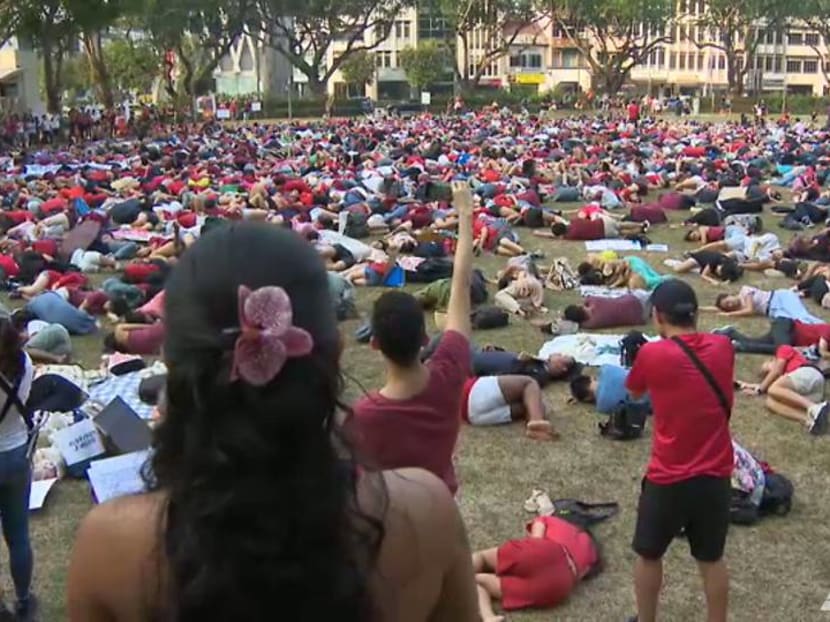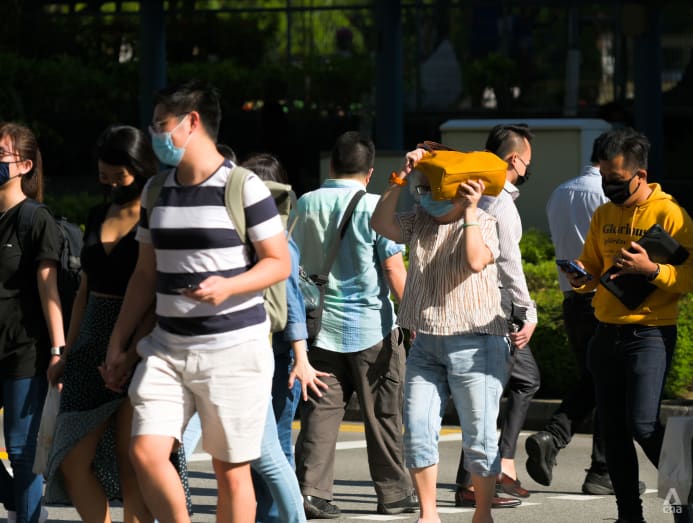Commentary: More people feel climate anxiety, and government inaction makes it worse
Advertisement
Commentary
Commentary: More people experience climate anxiety, and regime inaction makes it worse
Climate modify is emerging as a chronic stressor to people worldwide, and eco-anxiety emerges as a rational response, say climate advocates.

Participants at the climate modify rally lie on the ground as part of a "die-in" - a move to show collective grief over the loss of biodiversity and human being lives resulting from climate change. The result took identify at the Speakers' Corner in Singapore on Saturday Sep 21, 2019.
SINGAPORE: You might take read about plastics in landfills or seen footage of devastating wildfires. Or braved torrential rain on your style to the supermarket. The adjacent solar day, the exact same trip might get out you drenched in sweat because of the unrelenting heat.
Climatic change is rapidly becoming our reality. While the impacts of climatic change on our physical health are obvious, information technology affects us psychologically and emotionally besides.
The emotional reaction from a realistic threat perception of impending doom – even if spared from the direct trauma of experiencing extreme weather events – is gaining recognition as a phenomenon.
Eco-anxiety, eco-guilt, ecological grief, biospheric concern are some of many terms currently used to describe this phenomenon. But they mostly share roots of powerlessness, despair, or incertitude in anticipated or bodily environmental changes.
In a September survey of x,000 youths worldwide led past Bath University, close to 60 per cent take felt "very" or "extremely" worried about climate change, with 45 per cent reporting that their feelings well-nigh climate change negatively affected their daily lives.
Eco-anxiety affects people with existing mental health conditions as well. In a written report on obsessive compulsive disorder past the Academy of Sydney, patients have reported concerns directly related to climate change, leading to deportment such equally checking and rechecking light switches, taps and stoves.

Singapore has non been spared. A 2022 Pew Research eye study of advanced economies plant that almost 3-quarters of people surveyed in Singapore are concerned that climate modify will impairment them personally.
Prominent public forums such as The Good Space and the Singapore Writers Festival take been facilitating conversations most eco-anxiety.
ECO-ANXIETY AS A RATIONAL RESPONSE TO Modify
"Change tin can affect united states unconsciously and we can become traumatised without that understanding of why," Dr Denise Dillon, lecturer in James Cook University (Singapore) who studies environmental psychology, explained in a podcast interview exploring the intersection of health and climate change.
"When in that location's too much conscious focus, which relates to morbid rumination, the anxiety could be really bad. On the other hand, as well little witting focus means there is avoidance or denial, and people could keep going down a trauma hole," she added.
Social media has also fabricated us extremely decumbent to doomscrolling, which refers to the trend to continuously gyre through disheartening news without the ability to step dorsum.
During the height of January 2020, only as news of COVID-19 broke, the Australian wildfires dominated media channels. Footage of fires filled Instagram stories and Twitter feeds, wildfire updates headlined major news sites alongside information on the developments of a global pandemic.
Conscious focus on such overwhelmingly bad news can take a cost on anyone.
NOT A FIRST Earth PROBLEM
The anxiety posed by climate change could also amplify existing anxieties in a few means.
Climate change will touch on people'south daily lives every bit it affects our food systems, economics and politics.
For communities who depend on natural systems for their livelihoods, climatic impacts will effect in lower yields, rising costs and greater financial precarity. Individuals living in vulnerable geographic areas may experience forced migration and displacement.
Individuals or communities that are marginalised and exposed to the impact of climate change are likely to face up outsized anxiety. Though levels were loftier through all participant countries, in the Bath University study of x,000 youth, respondents from poorer countries expressed greater worry and functional impairment.
It'south a "Lawmaking Red" for climate activeness, but will nations step upward their ambitions in Glasgow? Nosotros dive into the COP26 calendar on The Climate Conversations:
Climate disasters are too extremely stressful events to those who feel information technology. After the devastating Australian wildfires in 2020, Commonwealth of australia'due south national bushfire recovery not only covered physical damage just also an A$76 million package (Due south$76.5 million) allocated to mental health services for affected persons.
Approximately one in 5 people in highly afflicted communities experience persistent post-traumatic stress disorder, low and psychological distress.
To draw a parallel to Singapore, the Southeast Asian hazes in the summer months saw cancellations of outdoor events, air quality warnings, health cautions to individuals with respiratory and medical vulnerabilities and to those with no admission to air-purifiers or air-conditioning.
As we are learning from our feel with COVID-19, daily inconveniences of isolation and unpredictability could accept adverse furnishings on individuals' sense of autonomy and control, heightening stress levels.

CLIMATE CHANGE A CHRONIC STRESSOR
While negative responses to stressors such as work, family or financial issues are well-established – eco-feet, a circuitous alloy of emotions including fear, acrimony, grief, despair, guilt and shame, is increasingly recognised every bit chronic stress in its own correct.
The result of eco-feet could have a drastic impact on demographics. A 2022 Business concern Insider report found that nigh 30 per cent of Americans agree that a couple should consider the negative and potentially life-threatening effects of climate change when deciding whether to accept children or non.
In a 2022 survey by The New York Times of 1,858 men and women ages 20 to 45, 1-third of respondents reported planning to have fewer children than their ideal number. Another 11 per cent chose climatic change as a reason for not wanting children.
But the converse can be true also – climate change may induce inaction as a defensive response, and individuals may suppress or deny negative emotions. This can look like disengaging from environmental initiatives, tuning out of ecology news and feeling like every action is insignificant.
This apathy can be overcome when individuals engage in deportment that allow them to regain some level of agency be it going into nature, volunteering and organising with like-minded people.
"Rituals of mourning … can provide some construction or some recognisable pattern of activities in times of bewilderment or disorientation, to reorient people back into what their connections are," Dr Dillion suggested.
"It could even be the betoken of the petitions to salvage Dover and Clementi forests. That is them taking some kind of responsibility to practice even some modest thing."
Country INACTION ADDED TO MIX
While eco-anxiety has sparked interest as a mental health phenomenon, eco-anxiety should also be seen as a reaction to inaction of determination-makers.
The perception that governments equally failing to acknowledge or act on the crisis in a coherent, urgent mode, or answer to their alert, the Bath Academy study suggests, leads to feelings of betrayal and abandonment, and hence eco-feet.
If i views climate anxiety as merely an individual'due south natural response to impending ecological disaster, the solution would be psychological resource, or coping skills. However, climate change is a stressor that individuals cannot change lone, or in the foreseeable hereafter.
The natural reaction to doom and gloom is not about taking more than action to live more than sustainably, simply well-nigh taking action collectively. Channelling despair into such work is not easy, only the guilt tin be relieved when the burden is shared among like-minded people who can care for and support each other in difficult times.
These relationships built by communities affirm united states of america that nosotros are not in this solitary.
COP26 will run into state representatives accept to a global stage to hash out climate action. While such platforms are inaccessible to regular people, community leaders can button for sustainable solutions in their spheres of influence.
When people or countries come together in collective activeness, instead of helplessness, everyone can observe hope or empowerment.
Ann Hui Ching is a final-year medical educatee at the National Academy of Singapore, and host of Third Spacing (@thirdspacing), a podcast that explores issues on the peripheries of clinical medicine. Qiyun Woo is an ecology communicator that heads the projects The Weird and Wild on Instagram (@theweirdandwild) and Climate Commons, which explore climatic change and public empowerment through artistic visuals and graphics.
Who are the climate activists behind their pop social media accounts? The Climate Conversations sits down with The Weird and Wild's Woo Qiyun:
Recent Searches
Trending Topics
mcmilliancaravered44.blogspot.com
Source: https://cnalifestyle.channelnewsasia.com/commentary/climate-change-eco-anxiety-mental-health-ipcc-cop26-news-doomscroll-disaster-293616


0 Response to "Commentary: More people feel climate anxiety, and government inaction makes it worse"
Post a Comment